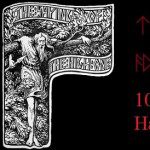
First I’d like to thank Morpheus Ravenna for saying all this so I don’t have to. Alison Leigh Lilly’s examination of related ideas from a different angle is also worth looking at. I particularly like this statement and question from Ravenna’s post: “The universe is full of structures that live, act, and function on every level, from the atomic to the multiversal. Why, my friends, would we think the same is not true of the Gods?”
So, with all that as foundation, let me go back to where we started…
Some of us (I count myself among them) feel that the gist of some Pagan thinking and ritual is a little too focused on the people involved, to the point of actually subordinating or excluding the divine beings to whom we are trying to relate. To some, that seems rooted in assuming that the Gods are like humans; to others a human approach to personified Gods is simply practical or effective, and the real issue is thinking the Gods are just here solely to look after our interests. When directed at the natural world I refer to this as the Disney Princess Syndrome: the presumption that Mother Nature is kindly and good in a human sense, that all of the birds and other woodland creatures are anxious to be our friends, or that good intentions mean jack to an angry raccoon. (If it sounds like I am referring to a specific incident with that last one, it’s because I am. Don’t ask). It occurs in other contexts as well; I have often encountered the stated presumption that some divinity or other’s dearest wish and primary goal is to speed along the personal development of individual human beings. Said personal development always seems to be very, very warm, fuzzy, and encouraging. I am suspicious of this idea, partially because like other forms of flattery it has utility as a tool for manipulation, and partially because in my own experience that is rarely true. Let me clarify: I’ve encountered plenty of Gods who were willing to help me out along those lines. Most of them also have other important things to attend to, and if I caught a particular divinity’s attention it was often because they had a task for me in mind. Further, “personal development” aka learning and growing and all that jazz is often distinctly UNcomfortable, and something that a person with more sense than I have would run away from. Just saying. In any case, like Morpheus Ravenna, I wonder at people who only call up their Gods when they want something…
Now… just because I don’t think that every divinity’s purpose in the world is to make us better people, it doesn’t mean that I don’t think relating to them is good for you. It is. It’s just that that is on you; it’s your choice and while you can ask for help and get it most times, not every being has time for that. Often, the ones who don’t are the most enlightening; they require you to stretch a bit and try to keep up. Sometimes you can’t, and that’s okay too. The longing I feel as divine presence or beauty moves away from me is a profound experience in its own right, and an under-appreciated one. Americans live in a culture that too often emphasizes winning and success to an unhealthy degree, and defines those things in even more unhealthy ways. Pain and loss and disappointment are a part of life; sometimes they make way for greater joys, and sometimes they just are. The fleeting nature of each moment of your life, good or bad, is what makes it precious.
While we should never assume that the Gods are like humans, or concerned with human things, it is a fact that some of them are. Ishtar is a goddess of all the things that make human society run and her foibles and strengths are rather human-like as well. Juno and Frigga are both very much concerned specifically with women’s place in culture and human life. I have relationships with two of the deities mentioned, because frankly you can’t run wild-haired through the woods all the time. When I was twenty-two I managed a pretty good approximation of it; now I am forty-six and have learned to appreciate the divine qualities of a coffee maker and a comfortable bed. Hail the Goddesses of Civilization! A recognition of the divine in nature to my mind also requires the recognition that we are part of nature and also partake of the divine. We humans have our own magic, our own evolutionary niche, and our own might. However, it is also true that in my experience none of the deities I mentioned appreciate too much focus on one’s self. They call you beyond yourself, to a conception of humanity that is bigger than you, and to service. And sometimes, that call can lead you outside the boundaries, right out of their domain into Somebody else’s. This is not a mistake.
When I personally say that I think ritual is sometimes too focused on the people involved (and people, period) to its detriment, I am not talking about abnegation or disdain for humanity. I’m more talking about the fact that we live in a speaking, complex, multilayered world, vast and mysterious. And as fascinating as human beings are, we are only a tiny tiny fraction of it. Looking and reaching outside ourselves, realizing that there is other consciousness and other being besides our own, is important. Vital even, and for many reasons. Given the state of things and especially our impact on the global ecology, it may well be a matter of survival; it is certainly a matter of balance and health for ourselves and our communities, human and non. It is also a path full of secret, silent, fey and terrifying joy.













